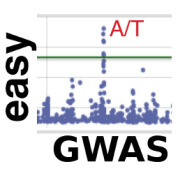We are developing and publishing several resources that might be useful for your research. Subsequently, you can find a brief description of our resoures and references for further information. If you are interested in more details and discussions about our resources, do not hesitate to contact us.

easyGWAS is a cloud platform for performing, analysing and comparing genome-wide association studies (GWAS). It allows for uploading genotype data and summary statistics of existing GWAS, and provides advanced methods for comparing GWAS results in an interactive and user-friendly interface. easyGWAS is also a public data repository for GWAS data and already includes published data and results. For more information, see this publication.

permGWAS is an open source tool written in Python to efficiently perform GWAS with permutation-based thresholds. permGWAS supports multiple CPUs as well as for GPUs. For more information, see this publication.

easyPheno is an easy-to-use and easy-to-extend Python framework enabling the rigorous training, comparison and analysis of phenotype predictions for a variety of different models, ranging from common genomic selection approaches over classical machine learning and modern deep learning-based techniques. For more information, see our documentation including various tutorials and this publication.
ProLaTherm is a novel Protein Language model-based Thermophilicity predictor. It leverages embeddings from a pretrained protein language model to get accurate predictions whether a protein is thermophilic directly based on its amino acid sequence. A manuscript for publication is currently under review.

ForeTiS is a time series forecasting framework in Python covering and fully automating the whole pipeline using state-of-the-art approaches. It provides powerful functionalities both for end users and model developers. For more information, see our documentation including various tutorials and this publication.
Gumbel AlphaZero ‘Play-to-Plan’ (GAZ PTP) is a novel algorithm for planning problems, which is based on the recently introduced Gumbel AlphaZero (GAZ) and in which the agent learns to find strong trajectories by planning against possible strategies of its past self. For more information, see our publication and talk at the ICLR 2023.
SynGameZero is a reinforcement learning-based approach for automated flowsheet synthesis for chemical processes. The agent is trained by transforming the task of creating a profitable flowsheet into a turn based two-player game. This transformation allows to employ a similar training procedure as used for AlphaZero. For more information, see the publications given here.